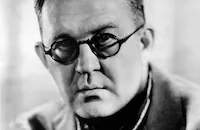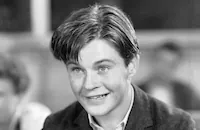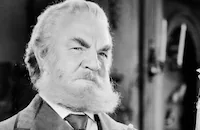Judge Priest

Brief Synopsis
Cast & Crew
John Ford
Will Rogers
Tom Brown
Anita Louise
Henry B. Walthall
David Landau
Film Details
Technical Specs

Synopsis
In an old Kentucky town in 1890, Judge William Pitman Priest reads the comics, and confederate veterans argue about their battles as ex-State Senator Horace Maydew tries to prosecute Jeff Poindexter, a sleeping black man, for stealing chickens. After the judge questions Jeff about his favorite fishing spot, he and Jeff go fishing, and Jeff subsequently becomes a part of the judge's household. When the judge's nephew Jerome, "Rome" for short, returns after getting a law degree, he is disappointed that the girl next door, Ellie May Gillespie, whom he loves, wants to end their courtship because Rome's mother Caroline objects that Ellie May's mother died in childbirth and no one knows the identity of her father. When Flemming Talley, an uncouth barber, visits Ellie May, the judge scares him away and encourages Rome to court her. Feeling lonely, the judge visits his wife's grave and sees Bob Gillis, an uncommunicative blacksmith, place flowers on the grave of Ellie May's mother. After Gillis punches Talley for making jokes about Ellie May's background and character, Talley and two others attack him with pool cues. Gillis cuts Talley with his knife, and Talley takes Gillis to court for starting the fight. Rome represents Gillis, and Maydew, who is running for circuit court judge against Judge Priest, demands an impartial judge. The judge, hurt and upset, steps down, and during the trial, Gillis' refusal to mention Ellie May hurts his chances to win. After Reverend Ashby Brand, who knows Gillis' past, confides in Judge Priest, the judge joins the defense and has the reverend testify that during the "war for the Southern confederacy," he recruited Gillis, a chain-gang prisoner, who fought nobly. The reverend's recitation of Gillis' heroic deeds builds to an emotional peak and climaxes when he reveals that Gillis, Ellie May's father, has secretly paid him to provide for her education. The courtroom explodes with adulation, Caroline wants to be Ellie May's mother, and during the veteran's parade that day, Gillis is asked to carry the confederate flag.

Director

John Ford
Cast

Will Rogers

Tom Brown

Anita Louise

Henry B. Walthall

David Landau

Rochelle Hudson
Roger Imhof
Frank Melton

Berton Churchill
Brenda Fowler
Francis Ford

Hattie Mcdaniels

Stepin Fetchit
Paul Mcallister
Matt Mchugh
Louis Mason
Hy Meyer
Grace Goodall
Ernest Shield
Vester Pegg
Paul Mcvey
Winter Hall
Duke Lee
Gladys Wells
Beulah Hall Jones
Melba Brown
Thelma Brown
Vera Brown
May Rousseau
Harry Tenbrook
Pat Hartigan
Harry Wilson
Frank Moran
Constantine Romanoff
Margaret Mann
George H. Reed
Crew
William Darling
Samuel Kaylin
Cyril J. Mockridge
Dudley Nichols
Dudley Nichols
Ed O'fearna
Albert Protzman
Royer
George Schneiderman
William Thomas
Lamar Trotti
Lamar Trotti
Paul Weatherwax
Sol M. Wurtzel

Film Details
Technical Specs

Quotes
Trivia
Notes
The working title of this film was Old Judge Priest. According to information in the Twentieth Century-Fox Records of the Legal Department at the UCLA Theater Arts Department, Fox purchased the motion picture rights to three "Judge Priest" stories for this film from Irvin S. Cobb: "A Treeful of Hoot Owls," which was first published in Hearst's International-Cosmopolitan, August 1930; "Br'er Fox and the Brian Patch," which was first published under the title "Br'er Rabbit, He Lay Low," in Hearst's International-Cosmopolitan, May 1931; and "Words and Music," which was first published in The Saturday Evening Post, October 28, 1911. The first two stories were included in the collection Down Yonder with Judge Priest and Irwin S. Cobb (New York, 1932), while the third story was included in the collection Back Home (New York, 1912). The publishers of the first collection, Ray Long and the R. R. Smith Corp., sued Twentieth Century-Fox and Cobb in 1938 because they received no compensation for the use of the stories, and in 1939, the studio settled with them for $2,000.
When Cobb learned that Fox planned to use in their screen credits for the film the statement, "Based on the Judge Priest stories by Irvin S. Cobb," he objected that the statement would not be accurate, as at the time he had written over seventy "Judge Priest" stories and planned to write still more, and that the statement might mitigate against future sales of his stories. He suggested a number of alternative statements, including the one used in the final credits, "Based on Irvin S. Cobb's character of 'Judge Priest'." Included in the legal records is a statement by Cobb in which he notes that the writers of the screenplay "practically created a new and different story from the material [i.e. the three "Judge Priest" stories] turned over to them" and that many of the characters in the film, including "Ellie May Gillespie," "Jerome Priest" and "Virginia Maydew" were not his creations. At a later date, Twentieth Century-Fox officials determined that a fourth "Judge Priest" story, entitled "The Mob from Massac," which was also included in the collection Back Home, provided the basis for one of the sequences in the film, but that the studio never purchased the rights to that story.
The character played by Frank Melton, although called "Flem Talley" during most of the film, is called "Flem Jones" in the courtroom scene. In the screen credits, Stepin Fetchit's name, although listed last, is in larger letters than the other cast members' except for Rogers'.
According to modern sources, a lynching scene was originally shot for the film, but was excised by the studio. The first draft screenplay, dated April 12, 1934, in the Twentieth Century-Fox Produced Scripts Collection, also at UCLA, contains a scene in which a mob of townsfolk are fixing to lynch "Jeff," the character who in the film was played by Stepin Fetchit. Having blood on his hands from some beef liver that had been eaten by dogs, Jeff is mistaken for another black man suspected of assault. The mob storms tries to storm the jail, but Judge Priest is summoned, and he sends them home. No information has been located to confirm that this scene was actually shot. Modern sources also list Robert Parrish as a cast member and note that the film was one of 1934's top grossing films. In a 1972 interview, John Ford noted that Judge Priest was his favorite picture of all time. In 1953, Ford directed another film, entitled The Sun Shines Bright, based on three of Irvin S. Cobb's "Judge Priest" stories, one of which was the above mentioned "The Mob from Massac." That film was produced by Argosy Productions, released by Republic, and starred Charles Winninger, Arleen Whelan and Stepin Fetchit (see below).












